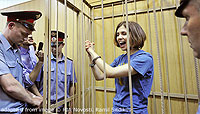Judicial reform needed now
Tim Wall - Moscow News editorial - themoscownews.com - 7.23.12 - JRL 2012-134
At first sight, the Pussy Riot trial in Moscow and a prisoners' hunger strike in Bashkortostan may not seem connected. But in fact both cases are eloquent arguments for why judicial reform should be an extremely urgent priority for the Russian government.

file photo
The trial of punk protesters Nadezhda Tolokonnikova, Maria Alyokhina and Yekaterina Samutsevich, who face up to seven years in jail on "hooliganism" charges for singing an anti-Putin song in Christ the Savior Cathedral, has sharply divided society. More than 50 percent of Muscovites in a Levada Center poll say the women should be freed, and the government seems to have balked at forcing through harsh jail terms now, instead extending their detention for another six months.
This is a sign of two important things: one, that the authorities are probably worried about the effect of a tough verdict on public opinion; and two, that everyone knows it is not the judge, but the Kremlin, who will decide the protesters' fate.
The system of "telephone justice" an anachronism that still persists, 20 years after the end of the bureaucratic rule of the Communist Party, means that no one from business people to political activists (and especially not ordinary people) in fact gets a fair trial in Russia today.
Money and connections speak far louder than facts in Russian courtrooms, and when that influence is most powerful, defendants' rights are routinely violated.
The situation is, on the surface, different in Bashkortostan prison colony No. 4, where up to 900 prisoners are refusing food after the alleged beating to death of fellow prisoner Sergei Lasko on July 17. There, it is simply that regional and federal authorities appear to be turning a blind eye to gross violations of human rights. The problem is a widespread system of abuse and torture, backed up by official indifference and cover-ups.
But both cases show the pressing need for reform, for truly independent courts and for real human rights in the penal system. These can only be guaranteed by judicial institutions being made accountable to society.
And this is exactly where independent NGOs, freed from interference by either the Kremlin or foreign governments, should play a key role.
Keywords: Russia, Government, Politics - Russia, Law, Corruption - Life in Russia, Music, Punk Rock - Russian News - Russia - Johnson's Russia List
At first sight, the Pussy Riot trial in Moscow and a prisoners' hunger strike in Bashkortostan may not seem connected. But in fact both cases are eloquent arguments for why judicial reform should be an extremely urgent priority for the Russian government.

file photo
The trial of punk protesters Nadezhda Tolokonnikova, Maria Alyokhina and Yekaterina Samutsevich, who face up to seven years in jail on "hooliganism" charges for singing an anti-Putin song in Christ the Savior Cathedral, has sharply divided society. More than 50 percent of Muscovites in a Levada Center poll say the women should be freed, and the government seems to have balked at forcing through harsh jail terms now, instead extending their detention for another six months.
This is a sign of two important things: one, that the authorities are probably worried about the effect of a tough verdict on public opinion; and two, that everyone knows it is not the judge, but the Kremlin, who will decide the protesters' fate.
The system of "telephone justice" an anachronism that still persists, 20 years after the end of the bureaucratic rule of the Communist Party, means that no one from business people to political activists (and especially not ordinary people) in fact gets a fair trial in Russia today.
Money and connections speak far louder than facts in Russian courtrooms, and when that influence is most powerful, defendants' rights are routinely violated.
The situation is, on the surface, different in Bashkortostan prison colony No. 4, where up to 900 prisoners are refusing food after the alleged beating to death of fellow prisoner Sergei Lasko on July 17. There, it is simply that regional and federal authorities appear to be turning a blind eye to gross violations of human rights. The problem is a widespread system of abuse and torture, backed up by official indifference and cover-ups.
But both cases show the pressing need for reform, for truly independent courts and for real human rights in the penal system. These can only be guaranteed by judicial institutions being made accountable to society.
And this is exactly where independent NGOs, freed from interference by either the Kremlin or foreign governments, should play a key role.